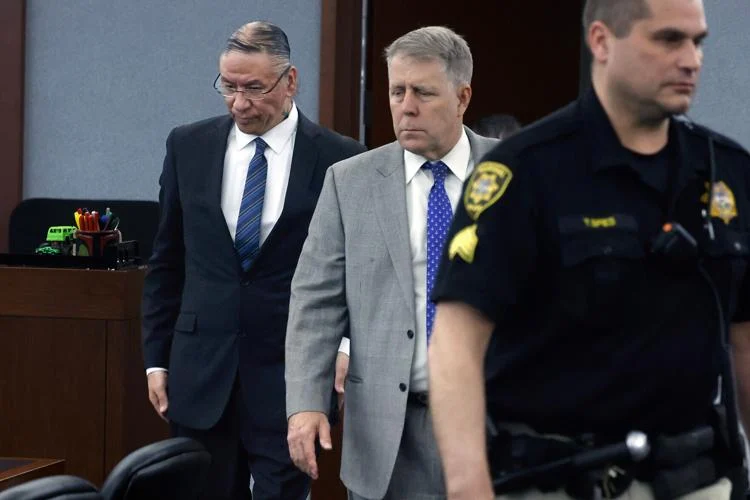Two unrelated incidents of college students hit by stray bullets within a week have left students and their families on edge over campus safety at colleges across the country.
The shootings near different campuses involved one student out for a jog and another walking to class. One died and one survived in the latest violence that has raised questions over security near college campuses.
Additionally, a Secret Service agent fired her gun while protecting President Biden’s granddaughter in the Georgetown area, and Temple University administrators continue to grapple with ways to protect students amid violence in north Philadelphia streets.
“Recently, there have been innocent people who were going about their day and minding their own business when they were injured by stray bullets,” retired Reno Police Lt. Joey Walker told Fox News Digital. “Those innocent people were not the intended targets of the person firing the gun, but nevertheless became victims.”
Most of these incidents — particularly stray-bullet shootings — are tucked into a catch-all category of “unintentional” gun violence in statistics provided by major national sources, such as the Centers for Disease Control and Prevention and the Gun Violence Archive, a nonprofit that’s been tracking gun violence in real time since 2013.
“Unintentional” gun violence accounted for about 1-2% of gun deaths in 2022, and 37% of gun-related injuries, according to the CDC and Johns Hopkins Center for Gun Violence Solutions.
There’s little research on this topic. A 2012 study that analyzed “stray bullet incidents” from March 1, 2008, to Feb. 28, 2009, is often cited.
The study found 81% of people hit by stray bullets “were unaware of the events leading to the gunfire that caused their injuries.”
That was the case Nov. 7, when Belmont University student Jillian Ludwig, 18, went for an afternoon run near her school and a stray bullet hit her in the head.
The alleged shooter, Shaquille Taylor, had been in jail earlier this year, and the local prosecutor said three doctors found him mentally incompetent to stand trial, meaning he couldn’t be prosecuted and was set free.
“Her roommate said she had been going [jogging] three to four times a week,” the New Jersey native’s mother, Jessica Thorn Ludwig, told Fox News Digital. “She had pretty recently taken up jogging, running, just for some exercise. It was a healthy habit that she was forming, as ironic as that is.”
Less than a week later, on Nov. 13, an unnamed Ohio State student was hit by a stray bullet in the leg, but the victim is expected to survive. The shooter is still unknown.
Walker, the CEO of Leading Edge Threat Mitigation who provides training on active shooter defense, said gunmen “usually fire” at “threats,” like rival gang members or drug dealers.
“When shots are fired by these criminals, everyone is at risk,” Walker said. “Even in an area where crime is less likely to occur, gun-toting criminals have invaded those areas and made their presence known.
“When criminals fire their weapons, they don’t care who is struck by their rounds, whether they hit their intended target or some innocent person of any age.”
Other colleges are located in “high risk/crime areas,” Walker said.
That includes Temple University, which is surrounded by a high-crime area in north Philadelphia that has been plagued for years by gun violence, muggings, robberies and home invasions.
In February, Temple University Police Sgt. Christopher Fitzgerald, 31, was fatally shot near campus while trying to stop a teen robbery suspect from the nearby suburb of Buckingham Township.
Earlier this week, a Secret Service agent fired her weapon to protect the president’s granddaughter, Naomi Biden, in the Georgetown neighborhood of Washington, D.C.
Secret Service agents encountered three individuals breaking a window on a parked and unoccupied government vehicle, the agency confirmed in a statement obtained by Fox News.
Fortunately, in this case, the weapon was fired by a trained law enforcement official, according to Walker, adding, “They’re responsible for every round that is fired.
“There was no threat to any protectees, and the incident is being investigated by the DC Metropolitan Police Department and the Secret Service,” the Secret Service said in a statement.
But it still doesn’t diminish the terrifying reality that another violent crime resulting in the discharge of a weapon happened so close to another college campus.
What can be done to protect students from random gunfire and stray bullets?
Walker said his specialty is finding proactive steps law enforcement can take to prevent casualties.
Students and faculty of every campus should be taught about the areas near campus “that have a known history or a propensity towards violent criminal activity,” Walker suggested.
“Knowledge of the areas a person will need to traverse through is of vital importance. Having that information in advance will allow individuals to make different choices to totally avoid those areas or significantly reduce their time traversing through those areas.
“Some of these incidents have occurred in areas that border high-crime neighborhoods or areas that run adjacent to college campuses or worksites a person may be required to traverse through.”
Walker stressed the benefits of knowing when neighborhoods are notorious for criminal activity around campus and suggested planning different escape routes if gunfire is heard.
“If the presence of any person or group gives off the impression of a threat to their safety, students should immediately and expeditiously leave the area,” Walker said.
“And if the sound of gunshots is heard, knowing the direction of where the shots are being fired from, and especially fired towards, can provide key information that can add to their safety.”
That’s great in theory, but under the stress of a life-or-death situation, or when adrenaline is spiking, thought processes can become clouded, the expert admitted.
As a backup plan, Walker suggested knowing which buildings students enter that are safe. Once inside, he said, it’s imperative to stay away from doors and windows, where bullets can pierce.
“In these times, law enforcement can only do so much,” Walker said. “Police may be hampered by many things such as lower staffing levels or politics that that may prohibit their ability to be proactive in patrols that would seek out potential issues before they erupt into violent episodes.
“All these factors are critical to staying as safe as possible.”
Shootings around college campuses leave students, families on edge: ‘Everyone is at risk’




